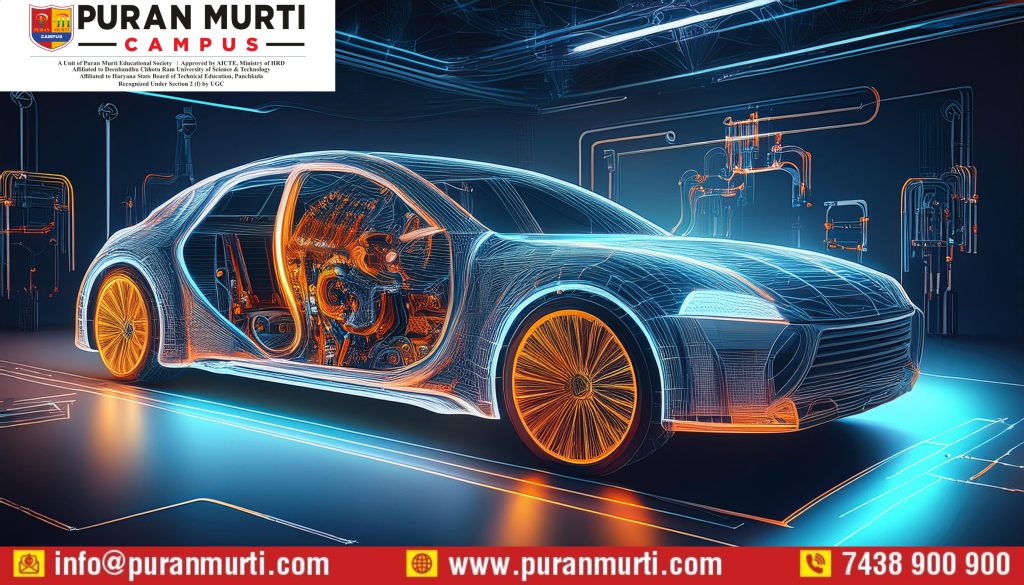A Diploma in Automobile Engineering opens doors to various career opportunities in the automotive industry. Graduates can pursue roles such as automotive service technicians, vehicle design engineers, and quality control inspectors. Opportunities also exist in automotive sales and marketing, research and development, and manufacturing. With expertise in vehicle systems and technologies, diploma holders can work with automotive manufacturers, repair shops, and service centers. Additionally, roles in automotive consulting, diagnostics, and even entrepreneurship in the automotive sector are viable options, offering a dynamic and promising career path.
Introduction:
A Diploma in Automobile Engineering provides specialized training in the design, maintenance, and repair of vehicles. This program covers automotive systems, engine technology, and vehicle dynamics, equipping students with practical skills for a range of automotive careers. Ideal for those passionate about cars and engineering, the diploma opens doors to roles in vehicle design, maintenance, and quality control, offering a solid foundation for a successful career in the automotive industry.
- Specialized Training: Focuses on the design, maintenance, and repair of vehicles.
- Comprehensive Curriculum: Covers automotive systems, engine technology, and vehicle dynamics.
- Practical Skills: Equips students with hands-on experience in automotive repair and diagnostics.
- Industry-Relevant Knowledge: Provides insights into current automotive technologies and trends.
- Career Opportunities: Prepares graduates for roles as technicians, engineers, and quality control inspectors.
- Technical Expertise: Develops skills in vehicle systems, electrical components, and mechanical systems.
- Certification and Accreditation: Often includes industry-recognized certifications that enhance employability.
- Foundation for Further Education: Serves as a stepping stone for advanced degrees or specialized certifications in automotive engineering.
Automotive Service Technician:
Automotive Service Technicians are responsible for diagnosing, repairing, and maintaining vehicle systems, including engines, transmissions, and brakes. Key skills include mechanical expertise, problem-solving, and knowledge of automotive diagnostic tools. Technicians must also possess attention to detail, strong communication abilities, and proficiency in using computer-based diagnostic equipment. Staying updated on the latest automotive technologies and repair techniques is crucial for effective performance in this role.
- Diagnosis and Repair: Identify and troubleshoot mechanical and electrical issues in vehicles.
- Maintenance: Perform routine maintenance tasks such as oil changes, brake inspections, and fluid replacements.
- Technical Expertise: Utilize knowledge of automotive systems and components to conduct repairs.
- Diagnostic Tools: Proficiently use diagnostic equipment and software to assess vehicle performance.
- Attention to Detail: Ensure accuracy in diagnosing issues and performing repairs.
- Communication Skills: Clearly explain problems and solutions to customers and work collaboratively with team members.
- Adaptability: Stay current with evolving automotive technologies and repair techniques.
- Safety Procedures: Adhere to safety protocols and standards to ensure a safe working environment and proper vehicle handling.
Vehicle Design Engineer:
A Vehicle Design Engineer plays a pivotal role in automotive design and innovation. They develop and refine vehicle concepts, focusing on performance, safety, and aesthetics. Key responsibilities include creating detailed design specifications, utilizing CAD software, and conducting simulations to test vehicle functionality. Engineers collaborate with multidisciplinary teams to integrate cutting-edge technologies and ensure compliance with industry standards, driving advancements in vehicle design and enhancing overall driving experiences.
- Concept Development: Create and develop innovative vehicle concepts and design features.
- CAD Expertise: Utilize computer-aided design (CAD) software to develop precise vehicle models.
- Performance Optimization: Enhance vehicle performance through design improvements and technological integration.
- Safety Compliance: Ensure designs meet safety standards and regulatory requirements.
- Prototyping and Testing: Oversee the creation of prototypes and conduct tests to validate design efficacy.
- Collaboration: Work with cross-functional teams, including engineers, designers, and manufacturers.
- Trend Integration: Incorporate the latest automotive trends and technologies into vehicle designs.
- Customer Focus: Design vehicles that meet customer needs and preferences, improving overall user experience.
Quality Control Inspector:
Quality assurance is crucial in the automotive industry to ensure vehicles meet safety, performance, and reliability standards. It involves systematic testing and inspection of components and systems throughout the production process. Effective quality assurance minimizes defects, enhances vehicle durability, and ensures compliance with industry regulations. By maintaining high-quality standards, manufacturers can prevent costly recalls, build customer trust, and uphold brand reputation for reliability and excellence.
- Safety Compliance: Ensures vehicles meet safety standards to protect drivers and passengers.
- Performance Reliability: Guarantees vehicles operate efficiently and perform as intended.
- Defect Prevention: Identifies and resolves issues early to minimize defects and recalls.
- Regulatory Adherence: Ensures compliance with industry regulations and standards.
- Customer Satisfaction: Enhances vehicle reliability and durability, leading to higher customer satisfaction.
- Cost Efficiency: Reduces costs associated with rework, recalls, and warranty claims.
- Brand Reputation: Builds and maintains a positive brand image by delivering high-quality products.
- Continuous Improvement: Facilitates ongoing improvements in design and manufacturing processes for better quality.
Conclusion:
Pursuing a Diploma in Automobile Engineering offers a rewarding career path with diverse opportunities in the automotive industry. This qualification equips you with essential skills in vehicle design, maintenance, and technology, setting the stage for a successful career. With a growing demand for skilled automotive professionals, the diploma provides a strong foundation for advancement and specialization. Embrace the chance to innovate and excel in a dynamic and ever-evolving field.
- Career Opportunities: Opens doors to a wide range of roles in the automotive industry.
- High Demand: Meets the growing need for skilled professionals in vehicle design and maintenance.
- Hands-On Skills: Provides practical, hands-on experience with cutting-edge automotive technology.
- Industry Relevance: Keeps you updated with the latest trends and innovations in automotive engineering.
- Foundation for Growth: Serves as a stepping stone for advanced studies and specialized certifications.
- Job Stability: Offers strong job prospects and stability in a vital industry.
- Creative Potential: Encourages innovation and creativity in vehicle design and problem-solving.
- Personal Fulfillment: Allows you to turn a passion for cars and engineering into a rewarding career.

